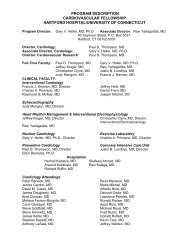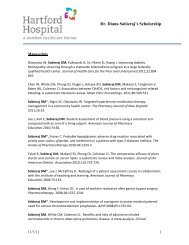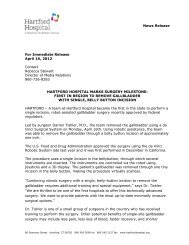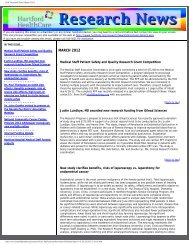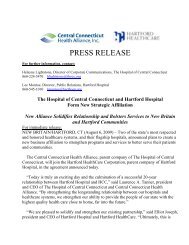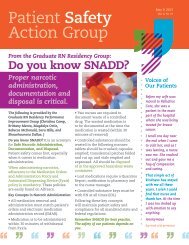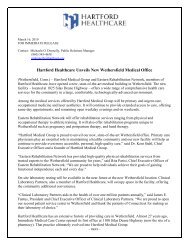Nursing Magazine, Spring 2013 - Hartford Hospital!
Nursing Magazine, Spring 2013 - Hartford Hospital!
Nursing Magazine, Spring 2013 - Hartford Hospital!
You also want an ePaper? Increase the reach of your titles
YUMPU automatically turns print PDFs into web optimized ePapers that Google loves.
•• The ADVOCACY of <strong>Nursing</strong><br />
Compassion and Communication<br />
Nurses of the Palliative Medicine<br />
Consult Service are advocates for<br />
patients and families dealing with<br />
serious illness.<br />
Advocating on behalf of the patient<br />
is an important part of every nurse’s<br />
role. But that aspect of nursing<br />
practice is especially vivid in the<br />
work of the nurses of the Palliative<br />
Medicine Consult Service. Patricia<br />
Frasier, RN, BSN, CHPN; Deidre<br />
Gaskin, RN, BS, CHPN; Maryann<br />
Steed, RN, MSN, CHPN; and Carol<br />
Strycharz, RN, BSN, MPH, are all<br />
seasoned nurses with long<br />
experience at <strong>Hartford</strong> <strong>Hospital</strong>.<br />
They are specially prepared to work<br />
with seriously ill patients, including<br />
those with complicated problems,<br />
those with chronic disease that has<br />
worsened and those who may have a<br />
terminal prognosis. The nurses help<br />
patients and their families<br />
understand their condition and<br />
treatment options and navigate the<br />
complexities of health care, and they<br />
communicate patients’ needs and<br />
goals to the health care team.<br />
Communication is at the heart of<br />
the Palliative Medicine nurses’ role.<br />
They listen closely to patients and<br />
families to understand what their<br />
concerns are. “They may say they<br />
don’t want treatment, for example,”<br />
Ms. Gaskin said, “but their real<br />
concern may be pain management.<br />
We help patients understand what<br />
doctors are telling them, and we help<br />
their health care team understand<br />
what the patient and family are<br />
telling them.”<br />
Sometimes the patient and the<br />
health care team have different<br />
ideas of what would be best for the<br />
patient. “We try to help patients<br />
understand what the big picture is<br />
and what they want from the<br />
medical community,” said Ms. Steed.<br />
“We try to make sure their voice is<br />
heard. What the patient or family<br />
wants is sometimes different from<br />
what the medical community is<br />
recommending.”<br />
Maryann Steed, RN, MSN, CHPN, visits with a patient.<br />
Ms. Strycharz recalls one very ill<br />
patient who wanted to be placed on<br />
dialysis. The medical team was<br />
reluctant, seeing dialysis as too great<br />
a burden for her body. But the patient<br />
insisted she would accept the risk,<br />
because she wasn’t ready to give up.<br />
“I went back to the team and<br />
explained that this was something<br />
the patient and family wanted to try.<br />
And the patient went on dialysis.”<br />
After several months, however, with<br />
other medical issues plaguing her, the<br />
patient decided the burdens of lifeprolonging<br />
therapy were greater than<br />
any benefits provided. But it was her<br />
choice. “She passed away, comfortably,<br />
with no pain and with her family by<br />
her side,” Ms. Strycharz said.<br />
“Very often, it’s just listening to<br />
patients and families that’s needed,”<br />
said Ms. Frasier. “They might just<br />
need help with small things, like<br />
asking the staff to close the door at<br />
night, so it’s quieter. Or it might be<br />
bringing a patient a prayer shawl or<br />
arranging visits from Pastoral Care.<br />
It’s often the details that make a<br />
difference in a patient’s or family’s<br />
experience.” In one notable case, the<br />
nurses and others arranged for a<br />
seriously ill patient to use Skype to<br />
be present at his wife’s funeral.<br />
All four nurses stress that they<br />
are part of a collaborative team that<br />
includes a vitally important member:<br />
the bedside nurse. “Every bedside<br />
nurse is an extension of what I do,”<br />
said Ms. Strycharz. “We can’t do our<br />
job without them. They’re the ones<br />
at the bedside 24/7. The information<br />
they share with us makes us better<br />
at what we do.”<br />
The Palliative Medicine nurses see<br />
themselves as advocates, not only<br />
for patients, but for bedside nurses.<br />
“Part of our job is to support the<br />
bedside nurse’s message about their<br />
patient,” Ms. Frasier said. “Many<br />
times, nurses have concerns about<br />
the plan of care, and we can support<br />
them in that.”<br />
Advocacy is a distinctive, but not<br />
the only, quality involved in the<br />
Palliative Medicine nurses’ role. In<br />
fact, it touches on all elements of the<br />
<strong>Nursing</strong> Professional Practice Model.<br />
“It involves so many aspects of<br />
nursing,” Ms. Frasier said. “It’s<br />
important to understand the clinical<br />
data, to be able to communicate well<br />
and have a caring attitude. I get to<br />
use all the things that make nursing<br />
a great career.”<br />
PHOTO BY LANNY NAGLER<br />
HARTFORD HOSPITAL NURSING / SPRING <strong>2013</strong><br />
7




